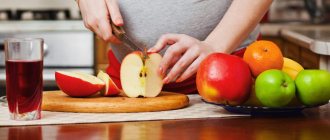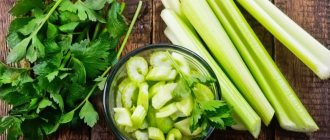Greetings, dear readers!
Almost every one of us, while carrying a child, and especially in the last weeks, faces the problem of swelling. Therefore, a diet during pregnancy with edema is necessary and must be followed. Swelling itself does not pose a health hazard, but it can cause inconvenience. You cannot put on your shoes or rings and your legs feel heavy. In most cases, edema is not treated with medication, but simply by adjusting your diet and this is enough.
Edema is swelling in certain parts of the body, which occurs due to a large accumulation of fluid in the tissues.
During pregnancy, due to the fact that the hormone progesterone and partly estrogen, enhances the relaxation of the walls of blood vessels, their permeability increases, and fluid from the vessels penetrates directly into the tissue. Gradually it accumulates in the legs, arms, stomach, face and even in the internal organs.
There are swellings
- physiological, in a hidden form, where a slight fluid retention is quite acceptable), they are hardly noticeable; when pressed, no trace remains, but is noticeable only when you remove socks, rings or bracelets, after which a pronounced stripe remains. Doctors call this pastosity. They occur in the heat, during physical activity, and if you have eaten something salty. Also, if I am overweight and have problems with veins (varicose veins), I experience swelling in my legs.
- pathological - with disorders of internal organs such as the liver, cardiovascular system and kidneys. The water-salt balance of the entire body is completely disturbed. They arise due to severe late toxicosis, which is called gestosis.
Edema during pregnancy: water imbalance
The main physiological cause of edema in pregnant women is the growing uterus, which with its weight puts pressure on the vessels, as a result of which venous outflow from the legs becomes difficult. In addition, due to pressure on the kidney vessels, their function is disrupted, and the removal of fluid from the body slows down. In this case, swelling is observed only on the legs and feet and disappears after resting with the legs elevated.
But there are more serious causes of edema during pregnancy. The fact is that pregnancy forces the expectant mother’s body to work under increased stress, so if a woman had a predisposition to any disease (which she might not even suspect), then it may manifest itself while expecting a baby. Among the most common diseases, one of the main symptoms of which is edema, are late gestosis (a complication of pregnancy, also manifested by increased blood pressure, loss of protein in the urine), diseases of the kidneys, cardiovascular and endocrine systems.
Edema in pregnant women is an alarming sign if it is observed in the following cases:
- appear in the first trimester of pregnancy;
- localized not only on the lower extremities, but also on the arms, abdomen, face, and can be asymmetrical;
- do not go away, and may even increase after a night’s sleep;
- are accompanied by a decrease in urine output, increased blood pressure, headaches, blurred vision, pain in the lumbar region, weakness, shortness of breath, etc.
In such cases, it is necessary to immediately consult a doctor, since a timely diagnosis and treatment can preserve the health of the mother and the unborn baby.
The basis of the diet for edema
The diet of pregnant women for edema is based on dairy and plant products, preferably with as little salt as possible.
It is worth eating a lot of vegetables and fruits, especially salads made from vegetables and vegetable oil, preferably olive oil. Food should also contain a lot of protein, calcium and iron. You should not eat a lot of sausage, salted and smoked foods, cheese, all kinds of cheeseburgers, avoid fried foods, nuts and seeds with salt, herring, pickles, and semi-finished products.
It will be better and healthier if you prepare food by baking, stewing or boiling. Drink clean water, freshly squeezed favorite juices, fruit drinks, all kinds of compotes, and please give up sweet carbonated drinks.
Menu (power mode)
When developing your own diet, you first need to pay attention to the amount of water consumed. It is important to follow a drinking regime during swelling.
The daily volume of fluid consumed should be a maximum of 1.5 liters. In this case, you need to take into account not only clean water, but also soups and liquids that are present in vegetables and juicy fruits.
You need to drink water in small portions throughout the day. If desired, drinking water can be replaced with green tea, lingonberry or cranberry juice, fermented milk products, rosehip decoction or compote.
The anti-edema diet should be agreed upon with a specialist, as he is able to develop it in accordance with the individual characteristics of the patient.
It is worth considering that in case of edema during pregnancy, you need to arrange fasting days once every 10 days. This will help cope with the problem and also improve your overall well-being.
On fasting days, you can combine different foods, but the total should not exceed 1500 kcal.
You can use the following example menu:
- low-fat cottage cheese and kefir;
- fruits or fruit salads dressed with yogurt;
- meat or fish combined with vegetables;
- buckwheat porridge with milk or kefir;
- potatoes and kefir.
At the end of the fasting day, it is necessary to gradually increase calories, which will balance the metabolism.
Women are advised to consult a specialist. He will develop the correct diet, which will need to be followed throughout the entire period of gestation.
Seventh day
1st breakfast: green apple, muesli, banana 2nd breakfast: 30 gr. bread, kefir, 20 gr. nuts
Afternoon snack: fish soup, green salad, 40 g of white bread, a glass of berry juice. Dinner: buckwheat soup, vegetable and herb salad, green apple, 30g. nuts, a glass of milk with a spoon of honey.
This is a simple diet that will definitely help you maintain and replenish the balance of vitamins in the body of both your baby and, of course, your own.
The diet is not at all strict, you can adjust it to suit yourself, depending on what week of pregnancy you are, maybe you have contraindications, you replace the forbidden product with something suitable for you and that’s it.
That's all, I want to wish you health and a good birth, take care of yourself! The most touching moments are ahead—meeting your baby!
By
Blood thinners during pregnancy
The most “diuretic foods” are melons and watermelons.
Blood thickens physiologically during pregnancy, this is a normal phenomenon and is considered to be the norm. Disturbances in the functioning of the cardiovascular system, hormonal disorders caused by pregnancy may well cause blood thickening.
Often a woman feels dizzy and nauseated, problems with the heart may appear, but the most dangerous consequence is possible thrombosis (vein blockage).
All this can be avoided if you eat foods that are healthy for your blood. You can replace aspirin, which is the main drug that thins the blood, with tomatoes. The effect is identical, and the benefits are undoubtedly great. If you make a tomato salad and season it with olive oil, the “therapeutic effect” will become much more pronounced.
Pomegranate juice is an excellent blood thinner, which, among other things, is rich in iron, necessary for those who suffer from iron deficiency anemia. Foods rich in vitamins and iron are the healthiest foods during pregnancy, having diuretic, blood thinning, and laxative properties. Natural fruit and vegetable juices are also rich in vitamins and minerals and have the ability to effectively thin the blood. Juices from citrus fruits are especially useful in this regard: oranges, lemons, grapefruits and tangerines, as well as pineapples and bananas.
Among blood thinning products, it is worth noting berries of all stripes. It is recommended to eat black and red currants, raspberries, blackberries, gooseberries and other berries. The only contraindication is individual intolerance (allergy).
Nutrition for edema during pregnancy, what foods are necessary and what is prohibited to eat
At the first signs of swelling, there are a number of dietary restrictions that a pregnant woman must follow. Daily nutrition should include the following products:
- Choice of milk, kefir, cottage cheese – 200 g.
- Sea fish – 150 g.,
- Cereals – 250 g.
- Beef, chicken, turkey 200 g.
You can eat fruits and berries in unlimited quantities; you should only be careful with allergenic foods.
Swelling and puffiness are especially dangerous in the third trimester, therefore, while carrying a baby, you should categorically exclude from the menu such foods as:
- Smoked meats,
- Salty food
- Hot spices,
- Alcohol,
- Strong tea, coffee.
What is possible and what is not?
Secondly, if you haven't followed a healthy diet before, now is the time to start. Due to the persistent stereotype “healthy = tasteless”, many people refuse natural products, preferring more harmful, and sometimes more expensive, semi-finished products and other artificial “delicacies”. Introduce fresh meat, vegetables, fruits, preferably natural juices, and more grains into your diet.
A complete, healthy diet for an adult can be tasty and healthy at the same time - just choose the right products and cook them without frying, sunflower oil and an abundance of seasonings. It is enough to last a couple of weeks without flavor enhancers and the difference will be obvious even to the biggest fan of junk food.
Don't forget about water. Paradoxically, if you have edema, you don’t need to give up excess fluid; on the contrary, you need to take at least 2.5-3 liters per day. These figures should contain no more than one and a half liters of pure water, the rest should be tea, drinks, juices, ingredients of dishes, broths. The habit of regularly drinking water (preferably mineral water, without gas) is highly recommended for any active and healthy person, and not just a pregnant woman.
What you can't eat:
- Pickled/pickled vegetables.
- Sweet soda, packaged juices.
- Fried/smoked/dried meat and fish.
- Products with obvious additives – prepared meat with seasonings, snacks, unnaturally bright confectionery, “quick” lunches, sauces.
Pregnancy can be an excellent reason to take care of your body and stop feeding it just anything.
When caring for your future baby, you will get used to a proper and healthy diet, making it the root of your daily diet.
The entire body - from internal organs and bones to skin, teeth and hair - will benefit greatly from such a change. With such a diet, swelling is practically impossible to come from, so you will only have to endure its distant manifestations, such as chubby fingers and ankles that ache in the evenings.
What you can eat:
- Cereals, porridge.
- Cottage cheese, dairy products.
- Boiled (baked) meat, fish.
- Fresh and canned fruits.
- Fresh, baked, steamed vegetables in any combinations and quantities.
- Baked goods (in moderation), natural sweets (marshmallows, marshmallows, marmalade, chocolate), nuts, dried fruits.
As you can see, from these numerous groups you can assemble a diet to suit every taste. A properly selected healthy diet will keep your body energized throughout the day, and as a bonus you will get a strong body, smooth skin, healthy sleep and no digestive problems.
Is it possible to eat watermelon for edema during pregnancy?
The red berry is characterized by diuretic, restorative, anti-inflammatory, and choleretic properties. And it is recommended for expectant mothers when edema appears. To ensure that the treatment does not have side effects, it is necessary to choose a watermelon that ripened in August, with no yellowish veins on the cut and with a clear characteristic pattern on the outside of the peel - these signs indicate the absence of nitrates in the fruit. Chemicals used in growing watermelon can lead to poisoning and pose a danger to the baby. During pregnancy, watermelon is eaten up to 500 grams at a time, separately from other foods and a few hours before bedtime.
Herbs
Diuretics during pregnancy for edema, from natural diuretics, unlike synthetic analogues, when used correctly, do not contribute to the removal of minerals and electrolytes from the body.
Herbs recommended for the treatment of edema:
- Pharmaceutical camomile. The crushed flowers of the plant (2 tablespoons) are poured with boiling water (250 ml) and steamed in a water bath for 20 minutes. The strained and cooled decoction is taken 100 ml no more than 3 times a day.
- Chicory root. The crushed raw material (1 tbsp) is steamed with boiling water (1 l) and boiled for 10 minutes. The chilled medicinal product is taken 100 ml up to 3 times a day.
- Birch leaves and buds. Dry raw materials (1 tbsp) are poured with boiling water (0.5 l) and infused for at least 30 minutes. The infusion is drunk no more than 4 times a day, 250 ml.
- Lovage. The roots and leaves of the plant have medicinal properties. Dried raw materials (1 tsp) are brewed in boiling water (250 ml) and left for up to 30 minutes. Take 1 tbsp. l. 3 times a day.
- Field horsetail. Dry herb (1 tsp) is poured with boiling water (200 ml) and left for 1 hour. Cooled and strained medicinal infusion is taken 1 tbsp. l. no more than 3 times a day.
- Bearberry for edema during pregnancy. Dry leaves (1 tablespoon) are brewed in boiling water (250 ml) and left for 12 hours. The filtered infusion is taken 1 tbsp. l. up to 3 times a day.
- Linden flowers. Dry raw materials (1 tbsp) are poured with boiling water (250 ml) and left for at least 40 minutes. The strained infusion is drunk 3 times a day, 200 ml.
When taking tea for edema during pregnancy, it is worth remembering that there are diuretic herbs that promote uterine contraction; their use is strictly prohibited - these are parsley root, juniper and strawberries.
Diet
The body swells due to the fact that the turnover of fluid in the body of a pregnant woman increases at least twice. If you have had problems with fluid removal before, pregnancy is almost 100% likely to worsen them. Most likely, it will not be possible to completely get rid of this problem, but with the help of a certain food organization, you can reduce it to a minimum.
First, eliminate the salt. Even if you can’t imagine eating without a salt shaker, be patient - you can return to your previous diet when the baby is born.
Salt by itself is not very beneficial, as it plays a key role in fluid retention. You don't have to eat everything bland. Add a little salt at the cooking stage, observing the minimum proportions, and you will see that this makes the taste of the food feel more distinct and fresh. It will not be easy to get used to this, but for the sake of health and stable body tone, you can get rid of a bad gastronomic habit.
Foods containing the most salt:
- Pickles, preserves.
- Smoked meat, sausages.
- Salted and smoked fish.
- Snacks, snacks, chips, etc.
Exercises and massage against swelling
Light physical activity will also help get rid of swelling. Special exercises have been developed for pregnant women that will remove excess fluid from the tissues. It’s easy to do them at home; nothing will interfere or hinder your movements.
You should start your classes with a simple gymnastic exercise:
- lie on your back;
- place a round cushion under your feet;
- perform 10 circular rotations with your feet in different directions;
- after 10 times, stretch your toes and heels forward;
- at the end of the warm-up, pull your legs bent at the knees towards your stomach 10 times for each leg.
70% of exercises to prevent swelling should be performed while lying on your back. They should be short-lived, because the growing uterus puts pressure on the vena cava and the pregnant woman may feel slightly dizzy.
Exercise 1
- get on all fours;
- take a deep breath and arch your back;
- lower your stomach down, straighten your shoulders and raise your head;
- as you exhale, raise your back up, stretch your chin down;
- repeat the steps 10 times.
Exercise 2
- sit on a chair or stool;
- keep your back straight;
- Place small objects on the floor and use your toes to try to pick them up and place them in your hands.
Swimming and walking are very useful for preventing edema. They improve blood circulation, the outflow of fluid occurs faster.
Visit the pool at least 2 times a week, you can sign up for water aerobics for pregnant women.
Take walks in comfortable shoes; this will not only be a method of combating swelling, but will also help saturate the body with oxygen and improve sleep.
If there are no contraindications, you can sign up for a massage room or ask a loved one to do a relaxing massage. Such manipulations stimulate a rush of blood to all tissues, which speeds up the process of getting rid of excess water.
In massage for pregnant women, 3 techniques are used: rubbing, kneading and stroking. The legs are stretched from the feet to the hips, the back - from the lower back to the neck, the arms - from the hand to the shoulder.
Cranberry juice recipe for pregnant women
Among the tips for getting rid of edema, lingonberry and cranberry juice are very common.
It’s easier to prepare cranberry - cranberries are more accessible and cheaper.
Absolutely anyone can make a drink that can’t even be called a medicine – a tasty and healthy drink, at home.
What is necessary:
- Sugar.
- Honey (optional).
- Fresh or frozen cranberries. It's okay if you freeze the fruits - let them thaw after the camera, there will be no differences in taste.
Instructions:
- Take a small bowl and thoroughly mash the cranberries in it until it becomes a paste. Squeeze the resulting juice through cheesecloth into a separate bowl.
- Pour the remaining slurry with water and boil for 10 minutes. The resulting broth must be filtered.
- After this stage, you can add honey - it will make the drink even more healthy and tasty. Pour honey in a proportion of 50 g per 1 liter of broth and stir completely.
- Now you need to add cranberry juice to the broth (with or without honey). Fruit juice can be considered ready-made, but it is usually not drunk hot - leave the drink to cool.
The result is a tasty, pleasant medicine that will not only please lovers of tasty and sweet things, but will also help cope with swelling, which makes it so difficult to put on your favorite things and shoes.











